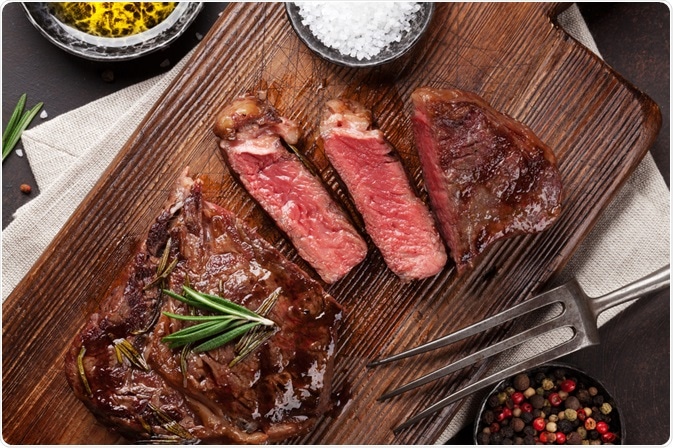Alpha-gal allergy is an allergy to meat products that manifests several hours after eating meat. This allergy is caused by an IgE-mediated antibody response to an oligosaccharide called galactose-alpha 1,3 galactose, which is found on animal proteins from a variety of species. Allergic reactions to this oligosaccharide epitope can occur in an immediate or delayed fashion.

Image Credit: Evgeny Karandeav / Shutterstock.com
Symptoms of immediate hypersensitivity
Immediate reactions due to alpha-gal allergy may occur within as little as 20 minutes of intravenous (IV) administration of the monoclonal antibody cetuximab. Reactions are both rapid and often severe, and may sometimes be fatal. In most cases, the drug can never be administered again to the affected individual.
Delayed hypersensitivity symptoms
Another type of hypersensitivity reaction that is manifested against the ingestion of red meat occurs in the form of urticaria, repeated episodes of anaphylaxis, and angioedema, mostly in people who spend much time outdoors. These patients will typically provide the treating clinician with a history of eating meat, either beef or pork, several hours earlier.
An intradermal allergy testing for meat in these patients is strongly positive, with the IgE for meat that is often found to be high. This is, therefore, designated as a red meat allergy. This group of patients also has high IgE levels against alpha-gal.
Organ meats, especially pork kidneys, cause a more severe and rapid onset of anaphylaxis as compared to red meat. Therefore, red meat must be ingested in a larger amount to produce the same symptoms.
People Are Becoming Allergic to Meat
Alpha-gal allergy vs. food allergies
Symptoms of a red meat allergy are distinctive enough to separate it from other food allergies. Like any food allergy, a red meat allergy will produce urticaria and gut-related symptoms. However, the symptoms start at least 2-3 hours after the ingestion of the suspect food.
Moreover, a red meat allergy is inconsistent, with symptoms not appearing each time the patient eats red meat. Many of these subjects may ingest meat-derived substances, such as gelatin, through many other food and non-food products without suffering ill effects. Most importantly, the patient's reaction to a red meat allergy is due to a carbohydrate antigen rather than a protein and requires a tick bite to become manifest.
Symptoms of alpha-gal allergy
The most common symptom of an alpha-gal allergy is severe pruritis, often over the whole body, especially of the palms and the plantar skin. This may often be associated with urticaria.
Many others have reported that they felt nauseous, experienced diarrhea, or had indigestion before the onset of the allergic reaction. Such symptoms are not a necessity, and many patients have no symptoms warning them of the onset of an allergy.
All patients with a red meat allergy have eaten red meat for years before their first red meat allergy attack . In most patients, there is no history of atopy or allergic disorders. They also have no history of allergy following the ingestion of turkey, chicken, or fish.
Other symptoms of a red meat allergy include the onset of anaphylaxis, including wheezing and respiratory difficulty, swelling, hypotension, and generalized collapse. Children older than 5 years will typically present with urticarial rashes, or angioedema, which is an allergic swelling of the lips and the throat.
Management
A red meat allergy must be treated on an emergency basis because of the possibility of a multi-system and fatal anaphylactic reaction. Therefore, an intramuscular epinephrine injection is required to arrest the reaction. This is the only drug that can act promptly to reverse the inflammatory changes underlying allergic manifestations, and should not be replaced by any other drug in cases of anaphylaxis. Repeat dosing is necessary if the response is suboptimal or the patient is refractory to the drug.
Bronchodilators, such as albuterol, are required to clear bronchoconstriction. These beta-receptor agonists, which can prevent airway narrowing during anaphylaxis, may be administered via nebulization or a metered-dose inhaler.
In addition, corticosteroids and antihistamines, with oxygen administration, may be required if the reaction is more severe. These drugs prevent mast cell and basophil degranulation which releases inflammatory mediators during allergic inflammation.
Other vasopressor drugs may be required to treat the hypotension in addition to intravenous fluids. Drugs like atropine may also be given if bradycardia is present, and glucagon to provide adequate blood sugar levels.
Once this condition has been recognized, patients should carry an auto-injection device containing epinephrine (EpiPen) with them for prompt treatment. In addition, patients should seek prompt medical care if they develop any symptoms following the ingestion of food. These individuals are also advised to avoid tick bites because the antibody levels slowly decline over time. Thus, some patients who have a red meat allergy are later able to tolerate red meat after several years without a tick bite.
References
Further Reading
Last Updated: Apr 27, 2021